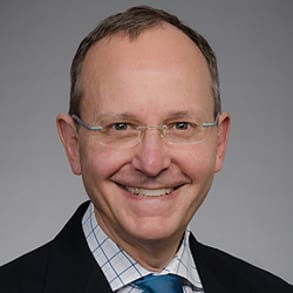Jeffrey Jarvik, MD, MPH

Dr. Jarvik is a neuroradiologist with specialized training in health services research, who has focused his research efforts on the imaging of low back pain and peripheral nerve disorders. He is a UW professor of radiology with a joint appointment in neurosurgery, an adjunct appointment in the Department of Health Services in the School of Public Health, and an adjunct appoint in the Department of Pharmacy. Dr. Jarvik was a Robert Wood Johnson Clinical Scholar at the University of Washington and a General Electric-Association of University Radiologists Radiology Research Foundation (GERRAF) grant recipient. Shortly after joining the faculty, Dr. Jarvik received an R01 from the Agency for Healthcare Research and Quality (AHRQ) with a percentile ranking of 1.1 to conduct a multi-center randomized trial to evaluate the cost-effectiveness of a rapid magnetic resonance imaging (MRI) method for patients with low back pain. The main results of this trial were published in JAMA in 2003. Since 2001 Dr. Jarvik has served as the associate director of the Multidisciplinary Clinical Research Center (MCRC) for Upper Extremity and Spine Disorders, a NIH-NIAMS funded center based at the Center for Cost and Outcomes Research (CCOR). He is the principal investigator of one of the center projects, a randomized controlled trial investigating surgical versus conservative treatment for carpal tunnel syndrome. This trial is also examining the utility of high resolution MRI of the median nerve. Another outcomes project was the Back Pain Outcomes using Longitudinal Data project, a multisite project that is funded by the AHRQ for 3 years (9/10-9/13). Dr. Jarvik earned his B.A. from the University of California, San Diego and graduated magna cum laude. He continued studying at UCSD and received his M.D. He did his internship at Mercy Hospital and Medical Center in San Diego, California and his residency at the Hospital of the University of Pennsylvania in Philadelphia where he also did his fellowship in neuroradiology. He came to the University of Washington with the Robert Wood Johnson Clinical Scholars Program. He did further training at the University of Washington and received his M.P.H.

